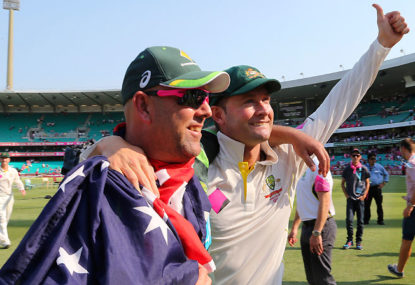It has always seemed coaching is at least partly a superstition. Australia’s Ashes whitewash will have people praising Darren Lehmann based solely on an observed correlation.
The team was losing, then Lehmann arrived, and they got better. It must be the coach, right? So says the mentality that sees football managers shuffled at whim like rosaries slung round the mirror of an Ecuadorian mountain bus.
If you don’t like your results, make like Roman Abramovich and keep sacking coaches until you end up back where you started.
In the face of repeated questions about both his position as England captain and Andy Flower’s as coach, Alastair Cook has repeatedly observed that when teams are going well, the captain and coach are hailed as great leaders and geniuses. When results change, they becomes incapable and incompetent.
Of course leadership affects a team, but there are many other factors swirling around.
A coach may be as assiduous as any in history with tactics and planning, but if his players can’t deliver on the field he will lose nonetheless.
On the other hand, poorly led sides can record great triumphs if one exceptional player produces sufficient brilliance.
It is reasonable to say this Australian side is united and happy under Lehmann’s stewardship.
This is also a slightly dim observation: of course they look united and happy when they’ve just won 5-0. But rather than that happiness being down to the result, one feels the result must be in part down to that happiness.
Australian players have consistently spoken about how good the team environment has been since Lehmann took over.
Even through a difficult tour in England, there was a sense of resilience and even enjoyment about the Australians. Various trials were made regarding players and batting positions, with a view to the home summer.
“I still say that’s one of the best tours I’ve ever been on,” said Lehmann after the fifth Test win in Sydney, “so from our point of view it was a learning tour if you like.
“You don’t want to lose 3-0, every game we play we’re trying to win, but in essence, in where we wanted to get to as a playing group on and off the ground, it was an exceptional tour for us.”
Once the summer arrived, you felt every Australian player knew exactly what his place was in the team and what was expected of him for the series ahead.
You also felt they were secure in having been given the series at that position, rather than playing Test by Test and fearing each might be their last.
With that kind of security in themselves, formerly unproven players were able to stamp some authority on the game.
Chris Rogers recovered from four low scores in his first five, going on to post 54, 61, 116, 11 and 119 from his next. Steve Smith came through two lean matches to score two crucial hundreds from the final three. David Warner shrugged off the accusation of inconsistency on a three-Test run of 49, 124, 29, 83*, 60 and 112. Shane Watson was Australia’s second-highest scorer behind Rogers across all ten Ashes Tests.
Mitchell Johnson was given free rein to attack as fast as he could in short spells, while pace colleagues Peter Siddle and Ryan Harris hunted around him, and spinner Nathan Lyon supported the three with admirable control.
The four only grew in confidence as a unit, and spoke constantly of their satisfaction at working together so well.
After claiming the world record for wicketkeeping dismissals during the Ashes in England, Brad Haddin notched another record for the most runs in a series by any batsman outside the top six.
He saved Australia time and again, and was as important as Johnson in regaining the Ashes. All this, after time out of the team that had many of us predicting he would never play for Australia again.
Whether it’s coincidence or not, all of these players have flourished during Lehmann’s tenure. If Lehmann has made them feel secure in their places and at home in the team environment, then much of the credit must be his.
Captain Michael Clarke ascribes to the theory. “I think Boof played a big part in allowing us to play with freedom, and a big part of that is the environment that’s created before you even walk out onto the field…
“Just his personality, the person he is, he creates a comfortable environment.”
Not that it’s not just about having a friendly presence in charge. “There’s a side to Boof that is as well prepared as any coach that I’ve ever played under. He’s very prepared in regard to the opposition we’re playing against and he and I did a lot of work even in England in preparation for the Australian summer.”
Of course Lehmann has planned assiduously – as much has been clear from Australia’s bowling and fielding plans against that choked the touring side. But with players of this skill, the psychology of managing them must be just as important.
From this perspective, it’s only right that Lehmann is given his due.
Geoff Lemon is a writer and radio broadcaster. He joined The Roar as an expert columnist in 2010, writes the satirical blog Heathen Scripture, and tweets from @GeoffLemonSport. This article was first published by Wisden India, in a new-founded Ashes partnership.





























































































